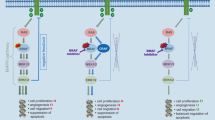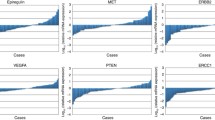Abstract
Clinical studies showed that only 10% of patients with metastatic colorectal cancer (mCRC) respond to treatment with the anti-epidermal growth factor receptor (EGFR) monoclonal antibodies panitumumab or cetuximab, regardless of the line of treatment. The current tool used to select patients, i.e. immunohistochemistry (IHC) evaluation of EGFR expression by EGFR pharmDx™ Kit, is not reliable in predicting response. Retrospective analyses of factors such as increased EGFR gene copy number and KRAS and/or BRAF mutations showed that such molecular changes could affect clinical benefit from anti-EGFR monoclonal antibodies. We report here the case of a 66-year-old man with chemorefractory mCRC, considered not eligible to salvage treatment with the anti-EGFR monoclonal antibody cetuximab and irinotecan because the primary adenocarcinoma of the rectum was found not expressing EGFR protein by IHC. However, FISH analysis of EGFR gene copy number and evaluation of KRAS and/or BRAF specific mutations by gene sequencing showed characteristics associated with favourable clinical outcome to anti-EGFR therapy. Based on the EGFR protein expression by IHC in a liver metastasis, the patient was then treated with cetuximab plus irinotecan, obtaining symptoms improvement and a dramatic objective tumor response in all sites of disease, lasting 4.2 months. We also discuss literature findings about the role of different biological characteristics in predicting clinical benefit from anti-EGFR therapy in patients with mCRC.


Similar content being viewed by others
References
Cunningham D, Humblet Y, Siena S et al (2004) Cetuximab monotherapy and cetuximab plus irinotecan in irinotecan-refractory metastatic colorectal cancer. N Engl J Med 351:337–345
Scartozzi M, Bearzi I, Beardi R, Mandolesi A, Fabris G, Cascinu S (2004) Epidermal growth factor receptor (EGFR) status in primary colorectal tumor does not correlate with EGFR expression in related metastatic sites: implication for treatment with EGFR-targeted monoclonal antibodies. J Clin Oncol 22:4772–4778
Lievre A, Bachet JB, Le Corre D et al (2006) KRAS mutation status is predictive of response to cetuximab therapy in colorectal cancer. Cancer Res 66:3992–3995
Benvenuti S, Sartore-Bianchi A, Di Nicolantonio F et al (2007) Oncogenic activation of the RAS-RAF signaling pathway impairs the response of metastatic colorectal cancers to anti EGFR antibody therapies. Cancer Res 67:2643–2648
Van Cutsem E, Peeters M, Siena S et al (2007) Open-label phase III trial of panitumumab plus best supportive care compared with best supportive care alone in patients with chemotherapy-refractory metastatic colorectal cancer. J Clin Oncol 25:1658–1664
Chung KY, Shia J, Kemeny NE et al (2005) Cetuximab shows activity in colorectal cancer patients with tumors that do not express the epidermal growth factor receptor by immunohistochemistry. J Clin Oncol 23:1803–1810
Pippas AW, Lenz HJ, Mayer RJ, Mirtsching B, Cohn AL, Windt P, Van Cutsem E (2005) Analysis of EGFR status in metastatic colorectal cancer patients treated with cetuximab monotherapy. J Clin Oncol 23 (Proc ASCO 2005): Abstract 3595
Moroni M, Veronese S, Benvenuti S et al (2005) Gene copy number for epidermal growth factor receptor (EGFR) and clinical response to antiEGFR treatment in colorectal cancer: a cohort study. Lancet Oncol 6:279–286
Sartore-Bianchi A, Moroni M, Veronese S et al (2007) Epidermal growth factor receptor gene copy number and clinical outcome of metastatic colorectal cancer treated with panitumumab. J Clin Oncol 25:3238–3245
Frattini M, Saletti P, Romagnani E et al (2007) PTEN loss of expression predicts cetuximab efficacy in metastatic colorectal cancer patients. Br J Cancer 97:1139–1145
Cappuzzo F, Finocchiaro G, Rossi E et al (2007) EGFR FISH assay predicts for response to cetuximab in chemotherapy refractory colorectal cancer patients. Ann Oncol (in press), DOI 10.1093/annonc/mdm492
Gravalos C, Sastre J, Aranda E et al (2007) Analysis of potential predictive factors of clinical benefit in patients (pts) with metastatic colorectal cancer (mCRC) treated with single-agent cetuximab as first-line treatment. J Clin Oncol 25 (Proc ASCO 2007): Abstract 4120
Khambata-Ford S, Garrett CR, Meropol NJ et al (2007) Expression of epiregulin and amphiregulin and K-ras mutation status predict disease control in metastatic colorectal cancer patients treated with cetuximab. J Clin Oncol 25:3230–3237
Lenz HJ, Van Cutsem E, Khambata-Ford S et al (2006) Multicenter phase II and translational study of cetuximab in metastatic colorectal carcinoma refractory to irinotecan, oxaliplatin, and fluoropyrimidines. J Clin Oncol 24:4914–1421
Finocchiaro G, Cappuzzo F, Jänne PA et al (2007) EGFR, HER2 and Kras as predictive factors for cetuximab sensitivity in colorectal cancer. J Clin Oncol 25 (Proc ASCO 2007): Abstract 4021
Di Fiore F, Blanchard F, Charbonnier F et al (2007) Clinical relevance of KRAS mutation detection in metastatic colorectal cancer treated by cetuximab plus chemotherapy. Br J Cancer 96:1166–1169
De Roock W, De Schutter J, De Hertogh G et al (2007) KRAS mutations preclude tumor shrinkage of colorectal cancers treated with cetuximab. J Clin Oncol 25 (Proc ASCO 2007): Abstract 4132
Schrag D (2004) The price tag on progress—chemotherapy for colorectal cancer. N Engl J Med 351:317–319
Conflict of interest statement
No funds or benefits in any form have been or will be received from a commercial party related directly or indirectly to the subject of this article.
Author information
Authors and Affiliations
Corresponding author
Additional information
Supported by research grants from Associazione Italiana Ricerca Cancro (AIRC) and Oncologia Ca’ Granda ONLUS Fondazione.
Rights and permissions
About this article
Cite this article
Moroni, M., Veronese, S., Sartore-Bianchi, A. et al. Controversial evaluation of EGFR protein and gene status in predicting response to anti-EGFR monoclonal antibodies in metastatic colorectal cancer: a case report and review of the literature. Targ Oncol 3, 127–130 (2008). https://doi.org/10.1007/s11523-008-0073-x
Received:
Accepted:
Published:
Issue Date:
DOI: https://doi.org/10.1007/s11523-008-0073-x




